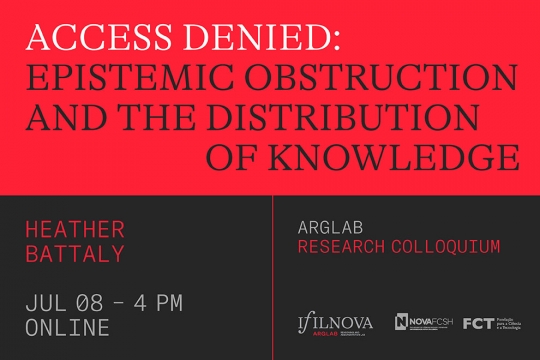
Heather Battaly sobre “Access Denied: Epistemic Obstruction and the Distribution of Knowledge”
No dia 8 de julho, pelas 16h, Heather Battaly (University of Connecticut) falará sobre “Access Denied: Epistemic Obstruction and the Distribution of Knowledge” no contexto do ArgLab Research Colloquium (ArgLab/IFILNOVA). Para participar na sessão, que terá lugar exclusivamente online, use este link.
O ArgLab Research Colloquium é organizado por Maria Grazia Rossi, Andrés Soria Ruiz e Nuno Venturinha no Laboratório de Argumentação do Instituto de Filosofia da NOVA. Para qualquer questão, entre em contato com Maria Grazia, Andrés ou Nuno.
John Greco’s The Transmission of Knowledge (2021) argues that for a speaker to successfully transmit knowledge to a hearer, the speaker and hearer must act jointly, trust each other, and occupy a reliable information channel. I argue that Greco’s analysis of knowledge transmission is too strong. Knowledge transmission does require reliable information channels, but it doesn’t require joint action or trust. I focus on cases in which speakers deliberately obstruct the flow of information, and deny access to a group of would-be hearers; i.e., cases in which neither joint action nor trust are present. I argue that in such cases, knowledge transmission to would-be hearers occurs when the epistemic obstructions blocking those channels are bypassed or dissolved. For instance, it occurs when journalists and lawyers gain access to the private information channels of speakers and their co-conspirators, and in so doing, gain access to the knowledge in those channels – e.g., knowledge that members of the clergy had committed sexual assault, or knowledge that smoking low tar cigarettes is still harmful. In sum, I sketch a picture of knowledge transmission that objects to joint action and trust as necessary conditions, but preserves Greco’s insight that reliable information channels are needed.
